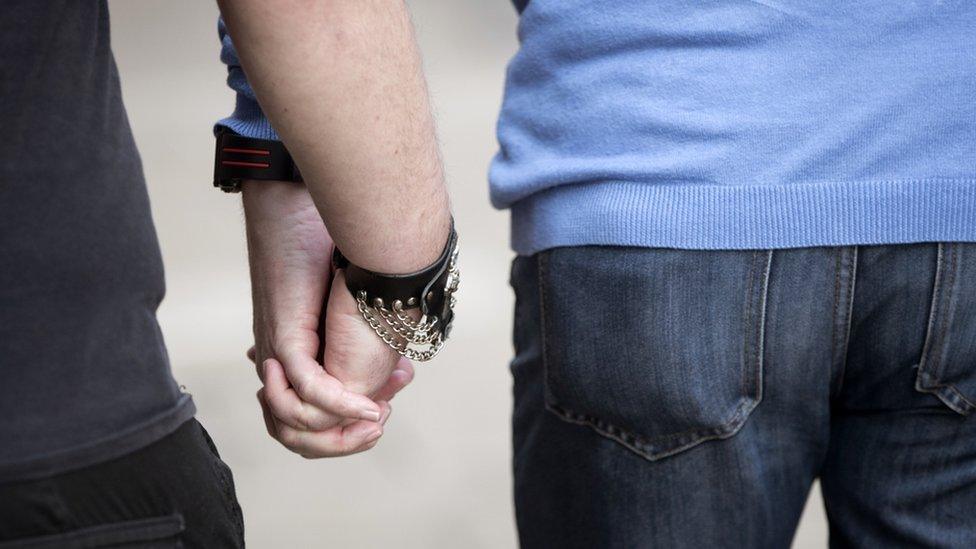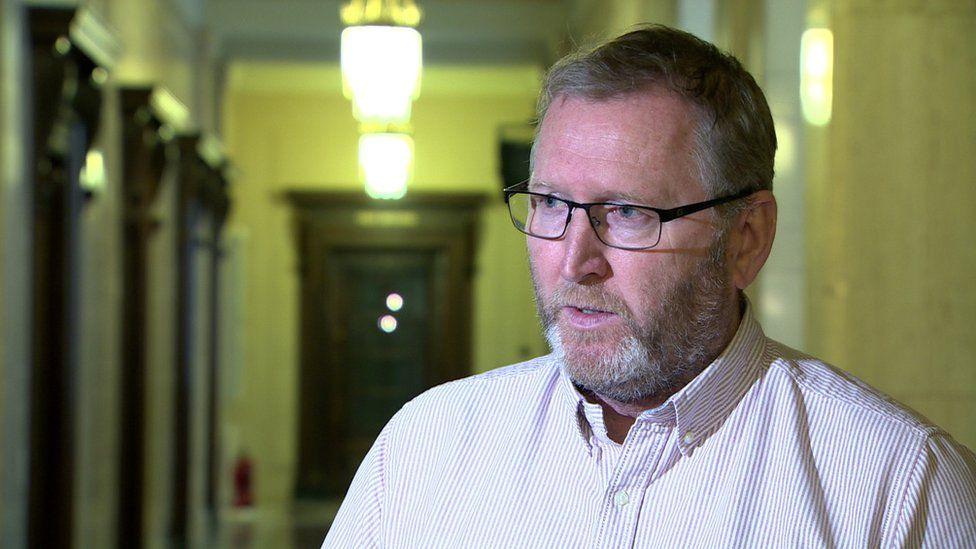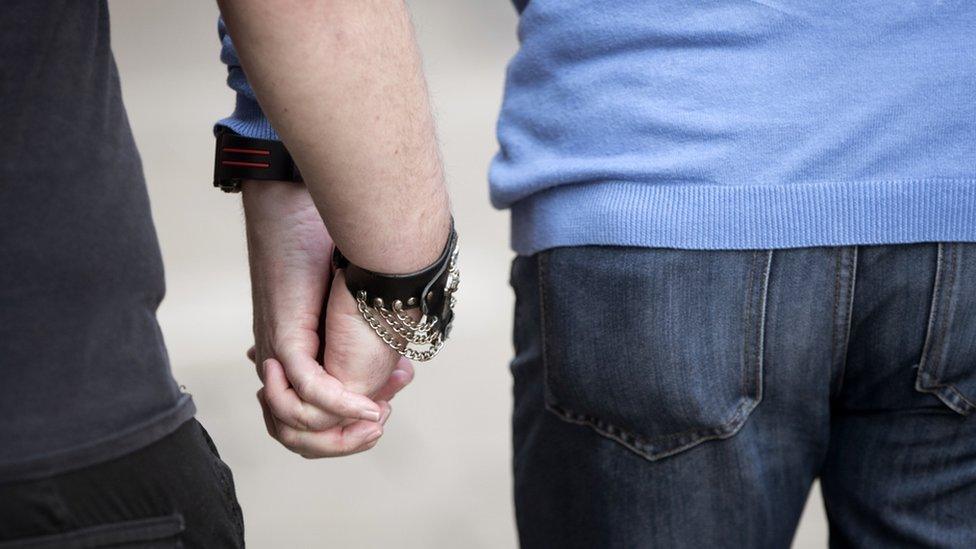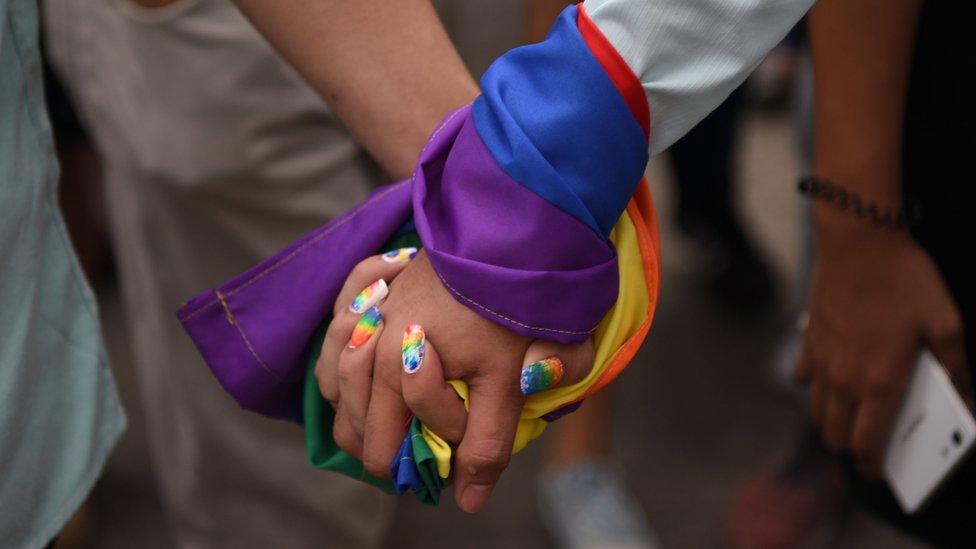Gay conversion ban: Therapy is a 'humiliating and harmful practice'
- Published

The motion argued it is "fundamentally wrong" to view the LGBTQ community as needing a "fix or cure"
Gay conversion therapy is a humiliating and harmful practice that needs to be banned, a Stormont assembly debate has heard.
Politicians on Tuesday passed a motion calling for a ban on gay conversion therapy "in all its forms".
It was proposed by Ulster Unionist assembly members (MLAs) Doug Beattie and John Stewart, external.
The non-binding motion argued it is "fundamentally wrong" to view the LGBTQ community as needing a "fix or cure".
It passed by 59 votes to 24.
Communities Minister Deirdre Hargey said her officials had started work to inform the drafting of legislation to ban conversion therapy.
MLAs rejected a DUP amendment that stated "legitimate religious activities" do not constitute conversion therapy.
It said those include preaching, prayer and pastoral support, and argued they "must be protected".
The amendment, tabled by DUP MLAs Pam Cameron and Robin Newton, called for legislative options to ban the practice of conversion therapy but did not include the "fix or cure" wording.

The main motion was brought forward by UUP MLAs Doug Beattie, pictured, and John Stewart
The main Ulster Unionist Party (UUP) motion was not supported by the DUP or by Jim Allister, Traditional Unionist Voice (TUV) leader.
The term conversion therapy refers to any form of treatment or psychotherapy which aims to change a person's sexual orientation or to suppress a person's gender identity.
The practice is already outlawed in Switzerland and parts of Australia, Canada and the United States.
Opening the debate, Mr Beattie said he was born a straight man and there was no fix or cure for him.
"There is no therapy that would make me a gay man. So why would we say that a gay man can be fixed or cured?" he asked.
"Why would we say that there's a therapy that can change a gay man to a straight man? There isn't. It's ludicrous. Conversion therapy is humiliating."
He said the motion was not about stifling religious freedom, but about banning a "harmful practice".

Dr Garry Adair Gilliland, who had conversion therapy in 2010-11
My experience was in a setting of a religious organisation, it was one-to-one work - it involved prayer, Bible studies and teaching around opposition to what they phrased as same-sex attraction.
It was really to reinforce that this was something that wasn't Biblical and was to persuade but also to teach me that my homosexuality was wrong.
It is a brainwashing technique… to try [to] reinforce that shame, to make you in many ways feel like there is no way forward with your sexuality in that way.
I went through the process over a year or year and half.
At the end of it I felt like I had nowhere to go - I felt completely destroyed by it in terms of my faith and I felt completely isolated by it.

The DUP's Ms Cameron, introducing the amendment, said the party was "firmly opposed" to conversion therapy and does not believe that members of the LGBTQ community need a fix or cure.
"However, we are concerned at the absence of any clear or evidence-based definition of conversion therapy contained anywhere within the motion. There is a risk that such ambiguity, if translated into legislation, would criminalise legitimate activities or conversations.
"We want to avoid unintended and unjustified consequences."
In an earlier statement, the DUP said discrimination against someone because of their sexual orientation was wrong.
The party said it did not support gay conversion therapy but said there must be a balance between safeguarding against "dangerous practices" and any attempt "to restrict freedom of religious belief, speech and association".
Communities Minister Deirdre Hargey agreed that the practice was cruel and inhumane and said legislation would be introduced as soon as possible.
Sinn Féin MLA Sinéad Ennis said it was fundamentally wrong to view the LGBTQ community as needing a fix or a cure.
"There is no cure required for being yourself, and you do not need to be fixed, because you are not broken," she said.
'Wrong side of history'
The SDLP's Mark Durkan said no-one should be told their identity was wrong.
"It needs to be said emphatically that sexual orientation is not a sin that needs to be confessed," he said.
Alliance MLA Andrew Muir said the DUP amendment had caused hurt and offence.
"All this amendment does is harm. The DUP needs to recognise that they are on the wrong side of history on this," he said.
Traditional Unionist Voice (TUV) leader Jim Allister said he had no difficulty condemning "gruesome practices historically associated with conversion therapies".
Mr Allister added LGBTQ activists wanted to "criminalise preaching in accordance with the sexual ethics that are set forth in holy scripture".
"They want to criminalise praying. Where there has been legislation, that's exactly what happened," he said.

Mike Davidson, of the Core Issues Trust, which offers therapy to gay men and women who seek a change in their sexual preference
Conversion therapy is an imposed title and one that we reject.
What I underwent was standard psycho-therapeutic and counselling support from registered psychologists and a psychiatrist - I found as I worked on my behaviours, the feelings subsided.
That is perfectly legitimate but unfortunately it has been demonised by those who put everything in one bag and call it conversion therapy.
We have to have checks and balances - we have ideological diversity here and both sides need to come to the table.
It cannot be that the LGBT community simply wipes out the ex-gay community.

This is the first time the assembly has ever formally debated calls to ban the practice.
In July, Prime Minister Boris Johnson announced plans to ban the practice in Great Britain.
Last month, Equalities Minister Liz Truss said the UK government would bring forward plans to ban gay conversion therapy "shortly".
The motion put forward by the UUP MLAs urged the assembly to declare "that it is fundamentally wrong to view our LGBTQ community as requiring a fix or cure".
It called on Communities Minister Deirdre Hargey to commit to bringing forward legislation before the end of the assembly mandate to ban the practice.
Related topics
- Published20 July 2020

- Published30 September 2020

- Published14 February 2019
